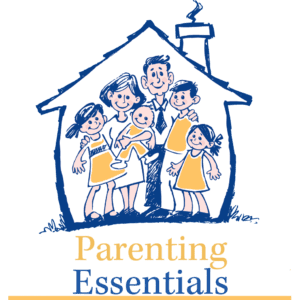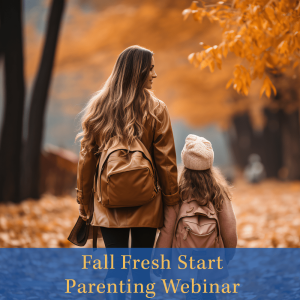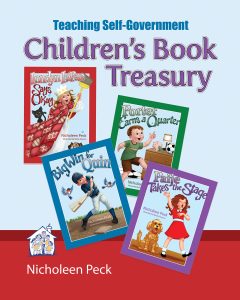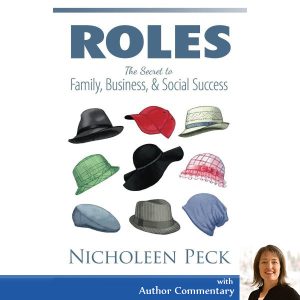“Choose Not to Be Harmed”
One day my father told me something so profound that it literally changed my social life and my personal empowerment forever. After I finished telling him about how another child at school had been mean to me, he said, “Nicholeen, sticks and stones may break your bones, but words will never hurt you.”
I’m guessing that I wasn’t the only child raised in the last quarter of the 1900s to be counseled by their parents or teachers with this advice (my dad was a teacher).
When I heard this advice, I immediately recognized it as true. Of course! Sticks and stones could cut me, bruise me, and cause me to bleed, but words were just things spit out into the air that I could choose to do whatever I wanted to with. This simple little truth gave me permission to ignore the words I didn’t like or knew weren’t true. And, since I knew my dad was the strongest, smartest guy in the world, I started ignoring mean words and ended up finding personal power.
I wish I could say I immediately started calmly ignoring. I didn’t. At first, I did a fighting kind of ignoring, which wasn’t really ignoring at all. When another child would say mean things, which has been renamed bullying today, I would holler at them, “Sticks and stones can break my bones, but your words will never hurt me.”
When I hollered my wise reply back at them, I immediately recognized that had I lost the upper hand. They would say, “Well, it looks like our words did hurt you or you wouldn’t have to yell back at us.”
I changed. I decided that if I really wanted to be safe from those unkind words, I had to not care that they said something I didn’t like or agree with. I had to allow them to say whatever they wanted to and choose not to get emotional about it. When I finally chose not to be emotionally reactive, I found my power. That’s what Dad was telling me to do with his “sticks and stones” advice, but it took me a few tries to fully understand how to apply this wisdom to my life.
Choose Not To Be Harmed
Marcus Aurelius said, “Choose not to be harmed — and you won’t feel harmed. Don’t feel harmed — and you haven’t been.”
If “sticks and stones” was good enough for a child of the 1980s, then why isn’t it good enough for children or adults nowadays? Why are there so many wars over words and talks of violence? Why are there so many offenses and hurt feelings that people won’t ignore? Where has all the power gone?
Dad drew a line for me that day. There was what was said by others, and what I thought about what was said. Those were two different things. Being emotionally reactive was not considered a plan for a successful life in the 1980s. In fact, this was the dominant way of thinking until recently. Dad wasn’t saying that words couldn’t be cruel or inappropriate to say to another person. Of course they could. Some things shouldn’t be said and are even intended to hurt the feelings of the other person. What my dad was saying was that a truly powerful person knows that they have total control over how they allow their emotions to relate to those words.
Dad’s advice challenged my feelings about words and the amount of power I thought I had. What if the person on the receiving end of the unkind words felt completely empowered to take control of their own thoughts? What if they pushed the emotions away before it was ever allowed to take root in them? What if each person was able to decide what truths or lies they allow into their minds and hearts?
The Coddling of Society
Look around. There are more emotionally fragile victims than ever before. Many youth are feeling confined and defined by their life experiences and hardships instead of rising above them and focusing on their human power to overcome trials.
On September 11, 2001, thousands died in the World Trade Center and Pentagon attacks, which started a war on terror that affected the world. Instead of hiding in their houses and focusing on their victimhood, people emotionally stood up and carried each other through the tragedy. People worked all day and night, putting their own lives at risk to save and locate people trapped in the wreckage. Neighbors called each other and prayed for each other. People donated money, food, supplies, time — literally anything needed to help make that hard time easier. Everyone stood a little taller, smiled a little more deliberately, and hugged a little more in an effort to really lift someone up. Americans, Canadians and many others worked harder, complained less, and found an inner strength they never knew they had. People generally become stronger because of war times and difficult challenges. But, in times of peace and comfort we behave surprisingly different.
A person has to logically and consciously allow themselves to change for the better, especially in times of peace. In their 2018 book, The Coddling of the American Mind, authors Greg Lukianoff and Jonathan Haidt explain that one of the “great untruths” of our time is “Whatever doesn’t kill you makes you weaker.” This means that society is obsessing over what has gone wrong in their lives and being pessimistic. People displaying bad behaviors are given excuses for their actions instead of correction or motivation to move on. And, words are the new violence that people can’t seem to get over. Each unkind word or social media comment turns into a burden to carry. Ignoring the words doesn’t seem to even be an option for some people.
Lukianoff and Haidt suggest the I-Generation is struggling the most with this new emotionally reactive living. They said, “…students make a serious mistake when they interpret words—even words spoken with hatred—as violence.” I-Gen-ers are now equating words to violence. If someone feels bad about something that has been said, others feel justified in retaliating with physical violence; bullying and assault. This explains the riots on college campuses in recent years.
Safe Vs Strong
Many adults nowadays aren’t reaching their youth because they see the world through a be-strong, learn-to-deal-with-adversity lens. Their youth are being trained socially to interact tentatively and fearfully with the world, like people who’ve been hurt and not recovered would behave. The youth want safety because they have been kept in a state of fragility, but many of their parents want them to step up and grow up.
How can we help young people find joy, and not become the victims of their circumstances? Russell M. Nelson said, “The joy we feel has little to do with the circumstances of our lives and everything to do with the focus of our lives.”
Society’s goal cannot be emotional safety. Of course, there is emotional abuse and that should never be condoned, but we are meant to get through life, not be protected from it. Life will never be emotionally or physically safe enough to protect everyone’s feelings. No “safe space” or word censoring rule will stop a person from feeling attacked if they are looking for the next attack. Here are three strategies parents can do to promote resilience and emotional strength, as well as decrease the social craving for “safe spaces.”
3 Strategies for Being Emotionally Strong
First, focus on who we are, where we are going, and what life is really about. Joy really has “everything to do with the focus of our lives.” When parents focus more on creating portfolios for their children than on building character and connection in their children, the whole family loses focus. When preparing youth for future financial success takes priority over preparing for future relationship success through happy family relationships, our youth lose their identities. Good family relationships, living according to virtue, and solid religious beliefs all bring greater lasting joy than financial success and social status can.
Second, increase patience and endurance by teaching the children to wait for things they want. Patience leads to increased responsibility for good outcomes in life. It teaches cause and effect and shows youth their circumstances can change with their own hard work. We have to stop enabling our children by giving them so much. The lesson of delayed gratification is a hard lesson to teach, especially if a parent could easily buy the desired bicycle or game, but it is one of the most valuable lessons to learn for the child. The more affluent a society gets, the less patient and whinier the population becomes. Nothing is ever good enough for a person with everything. If I can obtain any comfort or pleasure I desire when I want it with two day shipping and without having to talk to anyone about what I need, then why would I expect my discomfort from a mean word to go away any differently than instantly?
Third, teach children to ignore the things that bother them for the sake of their own emotional strength. This means having good old-fashioned grit in the face of adversity and mean words. To attempt to be ideologically protected is not a good life goal, so we can’t protect the youth from new or different ideas. In fact, learning new things and exchanging ideas is part of life. If a person has to know everything before they learn anything, they are short-sighted and setting themselves up for disappointment.
To teach children to ignore mean words, parents can prepare their children to accept “no” answers from them about everyday things when they are young, and then transition the child to knowing how to give themselves “no” answers as they mature. Then, when mean words or different ideas that they don’t agree with come along, they can ignore their emotions about the ideas and words by giving themselves a “no” answer for emotionally reacting.
Hopefully, if they are able to learn calmness and accepting “no” answers, they will be able to both push unwanted emotional responses away while focusing on listening to what the other person has to say and on valuing the other person even if they may ultimately have to disagree on the issue being discussed.
No external source can provide safety to a person who is determined to feel emotional. We have to choose to be unharmed; to control ourselves and our emotions. Not to “stuff” our emotions, but to decide which emotions are productive and which end up putting us in emotional bondage. Self-government is the act of choosing not to be harmed, even if someone intends to harm us.
The only true safety a person can ever have is the assurance that they can be okay no matter their circumstances. Ironically, in the age of “safe spaces,” we aren’t recognizing the safest condition a person can be in, which is emotional security despite adversity. It’s called “enduring to the end,” and it creates peace of mind and joy no matter what words try to hurt us.
This FREE Parenting Assessment Course will give you more direction in helping yourself and your children live more self-governed lives while unifying your relationships.





